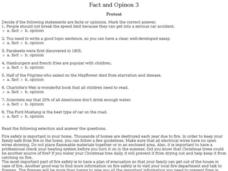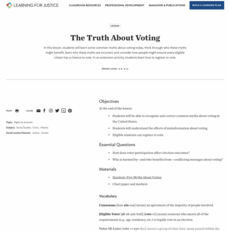Curated OER
Student Opinion: Are You Popular, Quirky or Conformist?
Approach the topic of popularity with this resource from the New York Times and their Learning Network series. The article is about Alexandra Robbins' "Quirk Theory." Learners respond to the article excerpt either on paper or online....
Curated OER
Individuality vs. Conformity
Spark an animated debate in your class! Young adults consider some of the fads or trends that are prevalent at their school, as well as their own level of participation in them. Just how much of a role does popular culture play in their...
Curated OER
Fact and Opinion: How to Tell the Difference
Students explore reasoning by completing a worksheet activity in class. In this fact vs. opinion lesson, students identify the differences between a personal opinion and something that is factually true. Students identify several...
Curated OER
Popular Culture & Diversity
The topic of cultural diversity is explored with the use of pop songs and lyrics. As a way to celebrate Harmony Day, small groups read, reflect, and present their opinions on how the lyrics they analyzed have expressed a statement of...
Curated OER
Opinion Surveys
Students examine the factors that affect the accuracy of opinion surveys. They calculate probability and chance using data they have collected. They practice reading tables and graphs as well.
Curated OER
Fact and Opinion 3: Pretest
In this fact and opinion worksheet, students answer multiple choice questions where they identify fact and opinion sentences and answer fact and opinion questions about a passage they read. Students complete 10 questions total.
Curated OER
The Star-Spangled Banner
Get your kids moving as they learn about the history of the United States National Anthem. Scholars examine the War of 1812, Francis Scott Key, and the meaning behind The Star Spangled Banner as they listen to an 18-minute...
Curated OER
Persuasive Writing Skills Worksheets
What makes you want to buy that new car? Or vote for that popular politician? Study the persuasive techniques commonly found in advertisements or argumentative writing, including repetition, exaggeration, and fact vs. opinion.
Curated OER
Good Book, Bad Book: Lesson 2
An interesting way to incorporate pop culture and the elements that make a book good. Kids watch a clip from MTV Cribs, they discuss how good or bad books are similar to good or bad homes. They are all different and not everybody will...
VH1
Lesson 3: Marketing of Pop Music
Pop music and marketing are thrown into the mix to make a fun and engaging lesson. Learners listen to several pop songs and discuss the differences in musical style. They then get into groups and work together to decide how they are...
Friends of Fort McHenry
Citizens For and Against the War of 1812
Use this exceptional resource to examine the discourse and debate that occurred at the start of the War of 1812 with your class. Learners will first consider their own position on the war in a silent journal writing activity. Then after...
Curated OER
Determining Author's Point of View: The Sneeches
Determine the author's point of view in a text. Young readers read Dr. Seuss' The Sneeches and identify the author's purpose in the story. They identify persuasive techniques in writing, asking and answering questions to better...
C-SPAN
Electoral College Pros/Cons and Alternatives
If every vote counts, why do we need the electoral college? Middle and high schoolers study the Constitutional precedent of the electoral college, as well as its place in historical and modern elections, with an engaging social studies...
Curated OER
Cartoons for the Classroom: Literary Allusion vs. Pop Culture
In this current events activity, students analyze political cartoons that feature literary allusion and pop culture. Students respond to 2 talking point questions.
Bantam Books
The Tempest: Fishbowl Discussion Strategy
Readers learn together with a group discussion activity. As they read William Shakespeare's The Tempest, high schoolers prepare for a fishbowl discussion in which three or four learners sit in the middle of a large circle and have a...
Teaching Tolerance
The Truth About Voting
True or False: Only Presidential elections matter. Academics delve into common voting myths to understand what is true and why the election process is critical to democracy. The lesson uses group discussion, activities, and handouts to...
Curated OER
Bigger, Faster, Stronger . . . Higher
Students analyze popular feelings and beliefs about two major disasters: the sinking of the Titanic (1912) and the explosion of the Space Shuttle Challenger (1986). They compile evidence, through research and interviews, about how much...
Curated OER
Student Opinion: How Far Would You Go for Fashion?
Is being uncomfortable worth it if you look good? Inspire discussion about fashion and culture with a brief New York Times article about painful fashion. Whether used as a persuasive essay prompt or as a discussion starter, class members...
Encyclopedia Britannica
Electoral College Philosophical Chairs Debate
Because of the Electoral College, it is possible to win the popular vote in a US Presidential election and still lose the election. After researching the pros and cons of the Electoral College, class members engage in a structured debate...
Curated OER
How the Electoral College Works
Students research the history and mechanics of the Electoral College and formulate opinions as to whether this institution should be preserved, modified or eliminated. They predict future outcomes of electoral vs. popular votes.
Curated OER
The Electoral Process
Students study the history and mechanics of the Electoral College and formulate opinions as to whether this institution should be preserved, modified or eliminated. They compare and contrast electoral and popular votes in the...
Curated OER
Just the Facts, Jack
Third graders listen to music and discuss their responses to different styles separating their comments into facts and opinions. They evaluate a worksheet of statements by classifying the statements into fact and opinion.
Curated OER
The Voice of Voting: How do We Judge Design
Students examine various methods of judging popular culture and compare them to the judging of the People's Design Award. In this popular culture and design instructional activity, students research different ways of voting in popular...
Curated OER
Creating Propaganda
Students explore propaganda. In this lesson about personal opinion, students discuss a topic of interest. Students will determine their opinion about the topic and vote. Students understand propaganda and how it affects society.

























